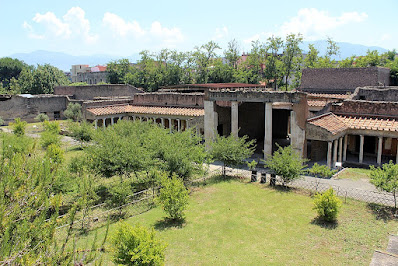[iv] Greek city-states
[10] Syrācūsae: Syracuse is an historic city
on the island of Sicily noted both for its rich Greek and Roman history,
culture and architecture, and as the birthplace of the mathematician and
engineer Archimedes. Founded by Ancient Greek settlers, it became a powerful
city-state, allied with Sparta and Corinth, and during Roman Rule it was
capital of the province of Sicily. The term Magna Graecia was used to
refer to the Greek-speaking coastal areas of Southern Italy. Later writers also
included Sicily.
https://en.wikipedia.org/wiki/Syracuse,_Sicily
https://en.wikipedia.org/wiki/Magna_Graecia
[11] Athēnae: One of the world’s oldest cities,
Athens was a powerful city-state and a centre for the arts and learning. It is
considered the birthplace of democracy and had considerable cultural and
political impact on Ancient Rome.
https://en.wikipedia.org/wiki/Athens
[12] Corinthus: Corinth was an ancient city-state and
developed as a commercial centre. In 146 BC, the city was destroyed by the
Roman army. In 44 BC, as a newly rebuilt Roman colony it became the
administrative capital of the Roman province of Achaea.
https://en.wikipedia.org/wiki/Corinth
[v] Byzantium
[13] Bȳzantium (present-day Istanbul) [Anc.
Gk. Βυζάντιον (Būzắntĭon)] was an Ancient Greek city which adopted the name of
Kōnstantinoupolis [Anc. Gk. Κωνσταντινούπολις; Latin: Cōnstantīnopolis;
Eng. Constantinople ‘the city of Constantine’] after its foundation under Roman
emperor Constantine I, who transferred the capital of the Roman Empire to
Byzantium in 330AD.
The Byzantine Empire, also known as the Eastern Roman
Empire, was the continuation of the Roman Empire in its eastern provinces in
late antiquity and the Middle Ages surviving the fragmentation and collapse of
the Western Roman Empire in the 5th century AD. It continued to exist for a
further 1,000 years until the fall of Constantinople to the Ottoman Empire in
1453. During most of its existence, the empire remained the most powerful
economic, cultural, and military force in Europe.
https://en.wikipedia.org/wiki/Byzantium
[vi] Egypt
Egypt (Aegyptus) was a province of the Roman Empire
from 30BC until 641AD. After the assassination of Julius Caesar in 44
BC, the Ptolemaic Kingdom which had ruled Egypt since the Wars of Alexander the
Great took the side of Mark Antony against the eventual victor Octavian, who as
Augustus became the first Roman emperor in 27 BC, having defeated Mark Antony
and the pharaoh, Cleopatra VII, at the naval Battle of Actium. After the deaths
of Antony and Cleopatra, the Roman Republic annexed the Ptolemaic Kingdom of
Egypt.
[14] Alexandrēa (Alexandria): Mediterranean port city
in Egypt founded by Alexander the Great; it was home to the Lighthouse of
Alexandria, one of the seven wonders of the ancient world, and to the Library
of Alexandria.
https://en.wikipedia.org/wiki/Alexandria
[15] Thēbae (Thebes): Ancient Egyptian city about
800km south of the Mediterranean, the ruins within the modern city of Luxor
https://en.wikipedia.org/wiki/Thebes,_Egypt














































